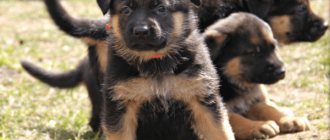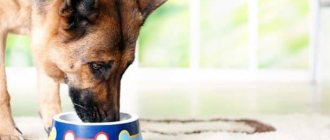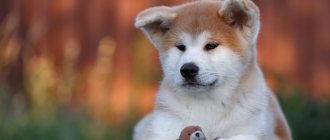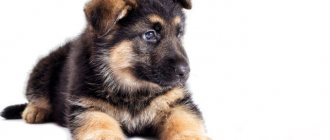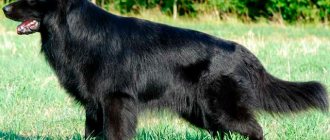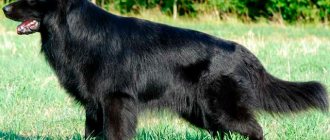German Shepherds are extremely intelligent and noble animals.
They are devoted to their owner and are ready to protect him to the very end, but without long-term care and nutrition, the pet cannot live a long and happy life.
Shepherd dogs have good health, but there are nuances in caring for them that must be taken into account when purchasing a puppy.
We will talk about these nuances in the article.
How to care for a puppy?
German Shepherd puppies are very active and temperamental, and if they are not cared for properly, they will not grow into good guard dogs. When purchasing a puppy of this breed, the owner must understand how much responsibility he takes on.
It is best to keep German Shepherds outdoors in a spacious enclosure in a private home. This applies to both adult dogs and small puppies. The pet will need to run and play a lot, and a large enclosure with a platform, a canopy and an insulated kennel where the puppy can wait out the bad weather is perfect for this.
You can keep the animal in an apartment, then you will have to arrange its own place in a warm corner, hidden from drafts. To do this, you will need to buy or make a soft bed with replaceable pillowcases, which must be changed twice a week for hygienic purposes.
At first, the puppy may be sad and miss its mother. To calm the animal a little, you need to pet it, give it some goodies, play, cuddle it, and calm it down with a gentle voice. German Shepherds are very intelligent and have a great sense of emotions.
Walk
If the puppy lives in an apartment, then you need to walk him a lot. 30 minutes is enough for a very small two-month old, but a six-month-old teenager can walk for up to 2-3 hours straight. If the puppy calms down and lies down right on the street, it means he has had a walk and can be taken home.
There are several factors to consider while walking:
- The puppy does not need additional loads; you should not force him to run after a bicycle or endlessly throw a stick at him;
- in the company of relatives, the puppy gets tired much faster, this is a good way to shorten the walking time and teach the pet to contact other animals;
- puppies love active games, they will happily run after a ball or a stick, but you should not harass the animal with such activity.
The older the animal gets, the less time it needs to walk.
Hygiene procedures
The most important thing when caring for a Shepherd puppy is to watch his eyes. If the eyes are red, watery, or pus is oozing from them, then you need to contact your veterinarian and follow all the recommendations prescribed by him.
Other hygiene procedures should be followed:
- brushing your teeth once every three months using a special toothpaste or powder. Special bones made of leather will help fix the teeth;
- cleaning the ears once a month using cotton swabs and a special product that is sold in veterinary pharmacies. If inflammation is detected, you must contact a veterinarian;
- bathing no more than 2-3 times a month only when absolutely necessary.
Caring for puppies is not at all difficult; it is important to maintain basic hygiene.
Nutrition
In the first weeks, to feed the puppy the same food that the breeder fed him to avoid severe stress in the baby. At six months of age, the puppy only needs 2-3 large meals on a specific schedule, the food bowl should be given at a certain time for 20 minutes and then removed.
NOTE!
Every week you need to check the growth chart and if there are strong deviations up or down, regulate this with the help of your diet.
The puppy can be fed both natural food and specialized food for puppies, but the most preferable option is a combination of natural and dry food.
Feeding your puppy regular food from the table strictly prohibited; this risks not only addiction and further begging, but also health problems, such as obesity.
The puppy should always have a bowl of clean, fresh water within easy reach.
Vaccination
When keeping a German Shepherd, it is important to pay close attention to the vaccination of your pet.
Dogs are constantly outdoors, in contact with other animals and the environment. To avoid infectious diseases of your pet and parasitic infection, it is important to give him all timely vaccinations.
The first vaccination for a German Shepherd puppy is given at one month of age. After vaccination, the dog must be especially carefully cared for: check his temperature, do not overcool him. The next vaccine is administered after a month.
The puppy's last vaccination is given at the age of 4–7 months. After this, the baby is allowed to walk outside. Further, routine vaccination should be carried out annually.
Basic rules for keeping an adult dog
Before accepting a new family member in the person of a German Shepherd, you need to familiarize yourself with the basic rules for its care:
- proper nutrition. The health and life expectancy of an animal depends on nutrition. The main principles: do not feed from the table, do not overfeed, give only the food that the dog can eat and that is appropriate for its age, there should always be fresh water available;
- health . It is necessary to take your pet for a preventive examination to the veterinarian once a year, but if there is a suspicion of a disease, then treatment should be started as soon as possible;
- physical activity . You need to provide your pet with sufficient space for physical activity (for example, an enclosure in a private house) or often take him for a walk. You need to play with your dog for at least one hour a day to release its physical activity;
- training and socialization . At a young age, a puppy needs to be introduced to other dogs and people, and picked up more often so that it gets used to people. In adolescence, you can already begin training, which German Shepherds respond very well to. You can train an animal throughout its life, rewarding it for success, as this not only disciplines, but also brings the pet and owner closer together.
Keeping a German Shepherd is not particularly difficult, but it still requires some attention and time.
Expert opinion
Kozhevin Semyon Kirillovich
Expert dog handler.
At first, when the puppy is still small, it is necessary to carefully monitor his health - if even a slight malaise is noticed, then you need to contact a veterinarian as soon as possible. Purebred animals are prone to diseases inherent to their breed, and if the problem is identified earlier, it will be easier to treat.
Proper nutrition is the second key to success. Without a properly formulated diet, a dog will not grow up happy and healthy.
Caring for a German Shepherd in terms of hygiene is quite simple - brushing the coat twice a week, cleaning the ears and teeth once a month (or when dirty) and bathing as necessary.
German Shepherd's attitude towards children
German Shepherds are balanced dogs, characterized by active behavior and self-confidence . Such pets are characterized by a reserved and kind disposition, intelligence and the ability to unquestioningly carry out all commands given by the owner. Having a dog of this breed at home requires monitoring the interaction of the four-legged pet with the smallest children, so it is not recommended to leave them together unattended.
For teenagers, the German Shepherd is quite capable of becoming a true and devoted friend, as well as a confidant. However, the child should not tease the dog or disturb it while eating, resting or sleeping. Children can easily take their shepherd for a walk on their own, but in this case it is very important to take into account the age of the dog and the physical capabilities of the child.
Return to content
Personal place
The best place for a dog in the house is a spacious enclosure, but if you decide to keep your pet in an apartment, then you need to arrange a comfortable place for him, which must meet certain parameters:
- The size of the bed should be large enough for the animal to lie on it comfortably. Pillowcases or mattresses should be removable so that they can be washed periodically;
- The bed should be located away from drafts so that the dog does not get sick;
- It is advisable to place the “bed” away from the passages so as not to disturb the dog while sleeping at home.
You can place the bed next to your own bed if such close proximity to your beloved pet does not bother you. The German Shepherd will carefully guard the owner's sleep.
Basic principles of training a shepherd dog
- There are no stupid dogs, only inexperienced trainers. Patience and a little effort. A dog that is not able to learn basic commands in 10 lessons will learn them in 20, and one that cannot learn them in 20 will still learn them in 30. Patience, patience, patience. And everything will work out! The main thing is not to despair and remember that a dog learns through repetition.
- You cannot correct a dog for things that it does not understand or has not been taught.
- One of the most important aspects of training is for the owner to learn how to apply the correct level of correction, and at the same time be able to immediately defuse the situation by rewarding the dog upon achieving the desired result.
- For a correction to be effective, it must be applied no more than 1.5 seconds after the violation.
- The trainer should not be passive.
- A dog can love but not respect its owner. When a dog shows disrespect, you need to increase the pressure on it. This must be done fairly, firmly and constantly.
- There is no need to humanize the dog.
- During the training process, the dog must learn to appreciate the good disposition of the trainer/owner.
- Dog dominance in any form must be fought. A dominant dog should always be under control.
- When correcting your dog, do not forget to reward it (with praise, treats, a free state) as soon as you have achieved your goal.
How to feed?
The German Shepherd is a fairly large dog that requires large amounts of food daily. Each owner chooses for himself how and what to feed his pet, but it is important to follow a number of rules to maintain the health of the pet.
Dry food
With dry food, everything is simple - it does not need to be prepared, it is stored for a long time and has the necessary set of substances for the development of a dog. You should not save on dry food and buy low-quality food - this will not end well, since the body of purebred dogs is more sensitive to low-quality food.
You need to feed your dog dry food at approximately the same time in limited portions, and fresh, clean water should always be available.
Natural food
With natural food, everything is more complicated - it needs to be prepared separately for the animal (it is strictly forbidden to give the same thing that the owner eats) and only from those products that are allowed for representatives of this breed.
The proper diet for an adult dog consists of:
- 30% meat . The dog gets the necessary protein from meat. You can give it raw, cut into small pieces or lightly boiled with boiling water. Chicken, lean pork, and beef are excellent. Meat can be mixed with porridge;
- offal . All of them are given raw, except for the liver, since there may be helminths there; it is first boiled;
- cereals _ Shepherd dogs can eat any porridge, including milk porridge, except for semolina, which is poorly excreted from the animal’s body;
- dairy . Cottage cheese, kefir and yogurt should occupy a significant place in the animal’s diet;
- vegetables and fruits . Shepherd dogs happily eat zucchini, pumpkin, beets, cabbage, and greens. You can give them cut into pieces or grated. Fruits - as a treat in small portions with the addition of a small amount of butter or sour cream for better absorption.
Feeding with natural food outperforms dry food in terms of variety, but loses in terms of time.
IMPORTANT!
Whatever the dog’s diet, the animal must have clean water around the clock. It needs to be changed daily.
The right diet
An important element of proper care and maintenance is a balanced diet. There are two options for feeding a German Shepherd:
- Natural food.
- Ready-made feed.
A natural diet includes meat, grains, vegetables and fruits. For animal protein, preference should be given to veal, chicken and turkey. Pork should not be given. Porridge should make up no more than 30% of the diet. Add a tablespoon of vegetable oil to them.
Fish, cleaned of bones, is given when the shepherd dog is one year old. The puppy’s diet contains fermented milk products: cottage cheese and kefir. Once a week you can add the yolk of one chicken egg to your food. Finely chop or grate vegetables and fruits. Bread, sweets, and spices should not be given.
German Shepherd puppies have very long hind legs. Therefore, it is recommended to add fertilizer containing calcium and phosphorus to the natural diet. This way you can avoid joint problems and rickets.
With the second feeding option, preference should be given to premium food. They are rich in all the vitamins and minerals a German Shepherd needs. Food should be selected according to the age and size of the German breed dog.
Are vaccinations necessary?
Vaccination is a great way to avoid many diseases and further health problems for your animal.
They need to be done according to a specific schedule:
- The puppy is vaccinated against hepatitis, parvovirus and coronavirus enteritis at the age of 1.5 months, and two weeks later, as prescribed by the veterinarian, they are re-vaccinated;
- The puppy is vaccinated against canine distemper at three months, and again after 6 months;
- Vaccinated against leptospirosis at 4 months;
- At 6 months they are vaccinated against rabies and repeated every year.
The listed vaccinations must be done according to schedule, otherwise serious health problems cannot be avoided. There are also a number of vaccinations that owners do at will (vaccinations against microsporia, trichophytosis, parainfluenza).
Dog puppy age for training
Educational training (accustoming to a leash and collar, reacting to a nickname, weaning off grabbing arms and legs, picking up from the ground, correctly taking a treat from your hands) can be started at 3 months, but it is better to start teaching precise execution of commands no earlier than 4-5 months. months.
However, there is no point in postponing training beyond 7-8 months. Especially with male dogs, who at this age begin puberty, self-esteem and the desire to dominate grow, and it becomes quite difficult to physically cope with them. Bitches are still more flexible in this regard. With non-aggressive bitches, you can start training classes at a later age, although it is not advisable to postpone them for a long time.
Grooming
Wool is one of the indicators of good animal health. If it is faded, dull and falls out, then you should take your pet to the veterinarian for an examination.
Hygienic grooming should begin as soon as the puppy arrives in the family, so that it gets used to the procedures. This is not the most pleasant process for dogs, so you will have to be patient.
There are two types of shepherd dogs:
- long-haired;
- shorthaired
To care for fur, you need to purchase the following equipment from a pet store:
- massage comb with metal teeth (long for long-haired dogs, medium for short-haired dogs);
- a slicker comb for brushing a dog during shedding;
- metal comb for combing hair;
- specialized shampoo and conditioner for animals.
Twice a year the dog begins to actively shed, during this period you need to comb the animal with a slicker comb, during the rest of the period 1-2 times a week you need to go through the fur with a massage brush to avoid the formation of tangles.
You only need to trim the hair in the neck and hind legs for the dog’s comfort. Only long-haired Shepherds require a haircut.
Basics of proper nutrition
With regular and normal feeding, you can raise a healthy dog. A diet containing all the necessary vitamins and minerals helps maintain good physical shape and longevity for your pet. A puppy's metabolism is much faster than that of an adult dog, but the ventricle is small. Therefore, it is worth feeding the baby often, but in small portions.
German Shepherd puppies eat from a dish attached to a special dog stand. The bowls are at chest level, the dog lowers only its muzzle while eating. As your pet grows, it is necessary to raise the height of the stand. This is necessary so that the spine, joints of the front legs and neck do not bend during feeding.
While the pet is eating, try to fix its stance: place the hind legs so that the hock joints form an angle of 90 degrees, and the front legs should be parallel to each other. It is advisable to have nickel-plated bowls, one of which, with water, should always be kept and the drink in it should be changed about three times a day. Keep the food temperature barely warm. When your baby finishes eating, wipe his face with a clean cloth.
There are two types of dog feeding:
- traditional;
- canned food, dry complementary foods.
The first year in a puppy’s life, proper nutrition plays a huge role; keep an eye on the balance of the diet. Follow the weight gain procedure correctly. Of course, preparing your puppy’s food yourself is much better than buying ready-made food, but whatever feeding system you choose, remember that each dog is individual, with its own preferences. It is possible to switch from feed to fresh products and vice versa, but you should not mix them. Before making the final diet, monitor your pet.
There are several rules when creating a proper diet:
- follow your diet;
- Meat alone is not complete nutrition;
- an overdose of vitamins A, D, calcium leads to intestinal volvulus;
- the daily protein intake should be 30% of the main complementary foods in order for muscles and skeleton to develop;
- Do not overfeed the puppy.
During the first week of living in your house, the puppy must be fed the same complementary foods that he ate from his former owner, otherwise his stomach may become upset. One serving is necessary so that the baby eats everything and licks the bowl. If he continues to stand near the dishes, it means there was not enough food. You don’t need to give an increase right away, your pet may get used to begging for snacks, it’s better to wait until next time. Depending on the time of your rise, the first feeding should be carried out, but no later than 7 am. The last feeding should be given at 10 pm.
From birth to six months, the development of the puppy occurs more intensively, and accordingly, the high calorie content of daily food also increases. At two months, it is advisable to give the baby a small amount of cartilage or raw bones, because a purebred German is still a predator. In order not to interrupt the appetite, bones should be given after the main feeding. This dish contains a large amount of minerals. If your pet doesn’t eat bones well, it means they are of poor quality or your baby has toothache. After six months, over the next 10 months, development levels out, and the need for complementary feeding increases. At 16 months, the shepherd dog becomes an adult, the amount of food provided per day decreases slightly, and the regime remains this way until the end.
The puppy should be fed frequently, with the following frequency:
- up to 2 months – 6 times a day;
- from 2 to 4 months – 5 times;
- from 4 to 6 months – 4 times;
- from 6 to 10 months – 3 times;
- after 10 months – 2 times.
How to properly maintain an apartment?
If it has been decided to keep a German Shepherd in an apartment, then you need to arrange a cozy place for it in the living room (you cannot place the dog in the bathroom, kitchen, hallway or balcony) away from drafts and heat sources.
NOTE!
Shepherds shed a lot, so it is important to regularly clean the apartment, especially if children, pensioners, or allergy sufferers live there.
Raising a Watchman
From about six months of age, the puppy is accustomed to a muzzle , first putting it on for a short time and rewarding the dog for it. Then, after six months, the dog needs to be trained to guard .
The German Shepherd has the natural qualities of a good guard, you just need to not allow strangers to play with your dog . When a guest comes to your apartment or house, you should not allow him to pet the dog. He must always be wary of strangers. When meeting a guest, place your pet next to you. In this case, when you are not around, he will never let a stranger into the yard or apartment.
That's all the simple rules that are not difficult to follow. As already mentioned, the German Shepherd is a naturally intelligent and obedient dog. You just need to put in a little effort to get the perfect dog.
Puppy training video
Developing general obedience skills
Developing general obedience skills
German Shepherd training - playlist
German Shepherd training - playlist
Training a puppy to stand and lie down
Training a puppy to stand and lie down
What accessories and toys are needed?
Before you bring your dog into your home, you need to purchase all the accessories necessary for it, such as:
- bowls for food and water (ceramic ones are preferable, they are more stable, preferably on a stand so that the pet does not have to bend over too much);
- a bed of a suitable size;
- everyday comb, slicker brush;
- hair shampoo, conditioner;
- hygiene products (for washing eyes, cleaning ears, etc.);
- collar and leash (for shepherd dogs you need strong, thick ones, made of durable material, but not a chain);
- toys.
Shepherds, especially at a young age, love to play, and toys will only please them. These can be rubber bones, balls, sticks, ropes and any other toys. The owner should be prepared for the fact that he will have to buy new toys often, since shepherd dogs have fairly strong jaws and strong teeth.
Traditional food
By choosing natural products, you are choosing the right approach to your diet. Let's look in more detail at what is best to feed your baby.
As mentioned above, a third of the food should consist of protein foods. This includes meat, mostly raw, eggs, and dairy products. It is impossible to raise a good dog by feeding a puppy only cereal. In addition to protein, the diet also includes carbohydrates, fats, vitamins, fiber and minerals.
Meat must be given in raw form daily, finely chopped in advance. Giving minced meat is a bad option; if the baby eats it, the stomach will not digest it. Thanks to this meat, the pet grows healthy and strong; it is the best material for building muscles and bones. It is necessary to start feeding with meat from 50 grams to a month, in a month they already give 100 grams, in two - 200 grams, in three - 300 grams, etc. The daily norm is best divided into three to four times. The following meat options are recommended: veal, beef, horse meat. It is best to cut off fat; it can cause indigestion. No pork!
By-products begin to be given to the puppy at four months, three times a week. Although the baby eats them well, they are not a substitute for meat. The liver is given only in boiled form, in order to prevent worms from entering the dog’s body. In addition to the fact that it is easily digestible and rich in vitamins A, B2, B12, nicotinic acid, iron, zinc, copper, liver also has high dietary properties. The udder, lungs, heart, kidneys, rumen, spleen begin to produce from six months. May contain useful elements such as vitamins A, B, calcium, and minerals.
Poultry by-products such as skin and entrails have high energy value. Tubular pork and poultry bones should not be given to shepherd dogs at all - the dog may choke. In addition, sharp fragments of such bones can injure the esophagus.
Eggs are a nutritious product; it is enough to give them once a week in the amount of two pieces. Only raw yolks, which can be mixed with porridge, are eaten. Raw proteins are not digestible. They can also be served as an omelet.
Dairy products. First place will be given to cottage cheese with a high calcium content. 350 grams daily will be enough. Chilled cottage cheese is mixed with whey and served in a porridge form. Then come yogurt and kefir, which have a good effect on digestion. It is best to give your puppy unboiled goat or cow milk daily.
Fish is rich in substances such as vitamins, trace elements and minerals. Serve only boiled, without bones, twice a week. But you need to be extremely careful when giving fish to your puppy, as freshwater species can be infected with tapeworms. We recommend giving fish after a year. Squids are very useful, helping to improve the properties of wool, containing vitamins B6, PP, B12, B2.
Dairy, animal, and vegetable fats are an integral part of a pet’s diet. They are based on vitamins and fatty acids, thanks to which the baby grows healthy and immunity increases. If you have prepared lean food, be sure to add butter or fat to it. Daily norm: 2 grams per kilogram of weight. Up to three months, 10 - 15 grams will be enough, from 3 to a year of months it is necessary to give 20 - 30 grams.
Carbohydrates in some cases can replace fats, giving the puppy energy for growth and proper bowel function. They are found in sugar, plant fiber, and starch. 10 - 15 grams of carbohydrates per 1 kilogram of weight is enough.
Bread and cereals are not the main food, so they are used in small quantities. For cereals, give preference to rice, millet, buckwheat, boiling them in the form of porridge with the addition of vegetables. "Hercules" is given after six months. 250 - 300 grams is enough to give daily. Gray or rye bread is given in small portions in the form of crackers soaked in low-fat broth.
It is better not to give legumes to your shepherd; she does not eat them well.
Vegetables can be given in grated form, making salads with a small addition of vegetable oil. Boiled pumpkin with porridge is a good choice for vitamin food. Stewed vegetables are easily digested by the stomach. It is advisable to periodically give your baby tomatoes, which he eats with pleasure, especially in winter; they do an excellent job of cleaning teeth from plaque. To prevent worms, add a clove of garlic to your pet's food. But potatoes are best eaten raw.
Herbs are an excellent vitamin supplement. Of all the herbs, it is better to avoid sorrel - it causes acute gastritis.
Fruits and berries are perfect for the diet, the introduction to which must begin at an early age. But avoid grapes and citrus fruits.
Mineral nutrition should be included in the diet every day so that the baby looks good. Pharmaceutical sulfur can be given a pinch along with meat to improve the quality of wool; Seaweed has a good effect on color due to its high iodine content. Eggshells contain calcium; they must be fed in powder form from 1.5 months with 0.5 teaspoon per day, increasing the dose to one teaspoon three times a day by four months. Meat and bone meal should be added to the puppy’s soup 2 times a week. When the shepherd grows up, this flour is placed in a separate bowl next to the water so that she can eat it whenever she wants.
It is not advisable to give sweets, because they make the baby eat poorly. If you want to pamper your puppy, it’s better to give him cheese or raw potatoes.
Follow a proper diet. Be careful when caring for your pet. When introducing new complementary foods, monitor the state of the digestive system and possible allergic reactions. Snacks between main feedings are not advisable. The puppy should eat in a quiet, calm environment so that nothing distracts him from eating. This is necessary for excellent feed absorption.
Did you like this article? Leave your comments.
Walking rules
If the shepherd lives in an apartment, then you need to walk with it at least 1.5-2 hours a day. You need to walk your pet in a spacious, open area, where he can run around to his heart's content, frolic, and play with a stick.
Ideal options would be:
- forest or forest belt;
- field;
- wasteland;
- big park.
If there are a lot of people around, especially children, then you need to walk the dog on a leash, even if it is very well-mannered. During play, a massive dog may not notice the child and knock him down, which in the future can cause problems for the owner of the animal.
As for walking in winter, in most cases shepherds do not need clothing - these dogs feel quite well at temperatures down to -10 degrees. But if the weather is too cold, then you can buy a jumpsuit for your pet.
Life on the street
If you live in a separate house, then keeping a German Shepherd outside will be natural. There is nothing to worry about here - the dog's coat will protect it from different weather conditions. Of course, in very severe frosts you should not keep your pet outdoors and it is better to find a place in the house itself. The rest of the time he will live well outside his native walls. Especially if you take care of your pet and build an enclosure.
Construction
To make an enclosure for a German Shepherd, you don’t need any special knowledge. Of course, if you are not ready to design it yourself, you can always hire specialists.
The room itself where the dog will be should not be particularly large. About 6 - 8 square meters will be enough. A prerequisite for an enclosure is the presence of a wooden floor and a roof over the head, which will protect the dog from rain and wind. But the sun's rays should fall inside the enclosure.
You should not make walls out of mesh; a German shepherd will chew through it without any problems. It is better to use metal rods and build a lattice from them. It will be ideal if you make only one wall this way, and the other three will be made of solid wood.
Inside the house
The frame of the enclosure has been built, now it’s time to do the interior decoration. First of all, set up a booth for your pet.
Its size should allow the shepherd to stretch out, but there should not be excess space. The booth can be made of medium-thick material without any gaps. Again, the tree will cope with this task perfectly.
Make the entrance round for the pet’s convenience. During the cool season, cover it with thin but warm felt.
Room hygiene
It is worth paying special attention to cleaning. To maintain order and cleanliness, it is best to sprinkle sawdust on the floor and clean dirty areas every three days. In return, do not forget to add new sawdust.
This material quickly absorbs moisture, thereby eliminating bad odors. Thanks to him, the enclosure is always clean and comfortable.
How to trim nails and clean ears correctly?
From infancy, you need to accustom your dog to having its teeth brushed periodically. If you do everything correctly, then in adulthood the pet will tolerate this procedure calmly.
For cleaning you need to purchase:
- a special brush for dogs;
- special toothpaste.
You need to brush your teeth once a month and at a time when the dog is calm. The best time is after an active walk, when the animal is tired and does not resist. You need to brush your teeth once every 1-2 months.
Trimming the nails of an inexperienced dog breeder can cause a lot of trouble, since shepherd dogs' nails are black and not translucent; it is not visible where the void ends and the living tissue begins. The best option is to take your dog to a professional for nail trimming.
There can only be one leader in a pack!
Your position as the leader of the pack is determined by your persistence, consistency and ability to always direct the course of games and activities. Unwanted puppy behavior, such as begging for undeserved treats or pestering, must be dealt with strictly and immediately.
You cannot encourage such behavior, otherwise your position as the undivided master will be shaken. An older shepherd will simply begin to ignore you, since you have not passed the authority test. It is enough to give in to the cute naughty man several times to lose the “leader’s crown.”
Bitches, by their nature, are less dominant and aggressive, and it is unlikely that it will come to open skirmishes for the right to “wear this crown,” but you will lose the right to be called a leader in the eyes of your own dog forever.
A male is another matter. As you grow older, your leadership habits will become stronger and sooner or later, in response to your shout or attempt to force the dog to act, you will see how the dog turns to you, baring its teeth ferociously and warning with a growl that it is ready to rush at you, defending its right to be called a leader. This is your last chance to prove that power can only belong to you!
In this situation, you cannot give in and such a “test” should only end in your favor.
How to bathe?
You need to bathe your shepherd dog as it becomes dirty, preferably no more than 1-2 times a month, otherwise the shampoo will wash away the protective substances from its fur, which can lead to diseases. If the dog gets slightly dirty after a walk, it can be rinsed with warm water; it is not necessary to use detergents.
It is best to bathe in the bathroom using a shower. First, you need to wet the coat, then apply shampoo, lather and rinse thoroughly, and then treat the dog with conditioner.
CAREFULLY!
If you do not completely rinse the detergents from the animal's fur, severe irritation may appear on its skin.
Communication and walks
The German Shepherd feels great in an enclosure, but this does not mean that now you should not pay attention to it. A dog of this breed very quickly gets used to its owner and has a hard time being separated from him.
Attention to the baby
Be sure to find time for affection and active play. This is the only way your puppy will grow up to be a mentally healthy dog. If you spend only a few minutes a day on your pet, you risk ending up with an angry or cowardly dog.
Of course, you don’t need to hang around the enclosure all day, otherwise the puppy may stop appreciating your presence.
Walks with the owner
The German Shepherd is an extremely temperamental dog, so it needs daily walks in the company of its owner. If this is not done, then the shepherd will have nowhere to put the excess energy. She will run senselessly around the enclosure trying to chew her way out.
Hikes can be short - half an hour a day will be enough. After all, the puppy already receives all the benefits from walks every day: sunlight, fresh air. All together will ensure good health and good psychological development for the German Shepherd.
How to train?
The German Shepherd is highly trainable, but it is important to start teaching it commands from infancy. If you miss this period, then in the future the dog will perceive the owner’s commands much worse.
In no case should you hit or severely punish a dog for failures, but you can and even need to punish for disobedience. If the puppy resists something and misbehaves, then you need to lightly press him by the scruff of the neck to the floor and sternly say “Ugh!” So, without violence, the pet will very quickly understand what this signal means and will obey it.
The German Shepherd is an ideal guard and good friend, loyal, loving and very brave. Representatives of this breed are ready to protect their owner and their family members until their last breath. They are very smart and quick-witted and that is why they can easily become full-fledged members of the family.
How to wean yourself from bad habits?
Bad habits can develop in all puppies, but they persist only if the dog is not raised correctly. You can wean it at any age, but the older the dog, the more difficult it is to do it.
Bite
- Raise by the withers so that the paws do not touch the floor. In this case, you should command “Fu” or “no”.
- Grab the face when the puppy tries to bite.
- Press your muzzle to the floor.
If an adult dog bites, the above methods may also work, but retraining it will be much more difficult.
We invite you to watch a video on how to wean a shepherd puppy from biting using another method:
Jump on the owner
- If the animal has been taught the “Sit” command, then it can be stopped in this way every time it is preparing to jump.
- Grab the front paws. Shepherd dogs do not like to be restricted in their movements, so after some time they will stop doing this.
- Gently move the dog away every time he jumps, and then walk past him. The shepherd will understand that you are ignoring him because of some specific action.
Barking for no reason
- Give the shepherd enough attention.
- Teaching the “Quiet” command and using it if the dog just starts barking.
- Spray with water.
- Touch the ears of a barking dog.
- Distract yourself to something else.
